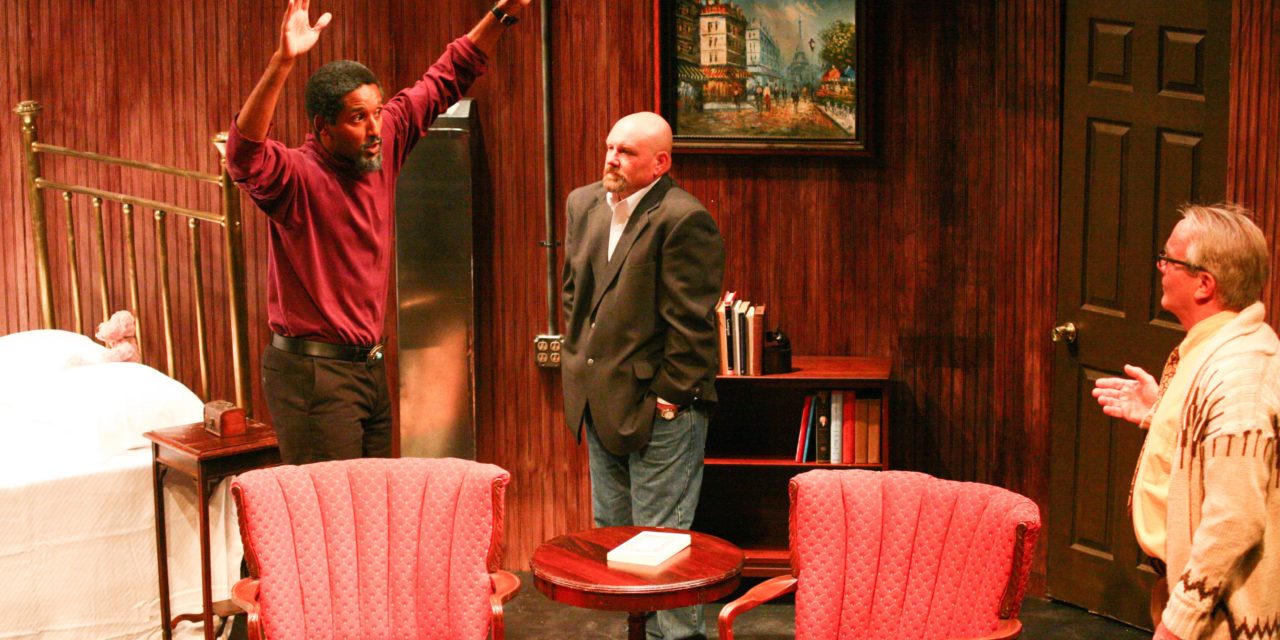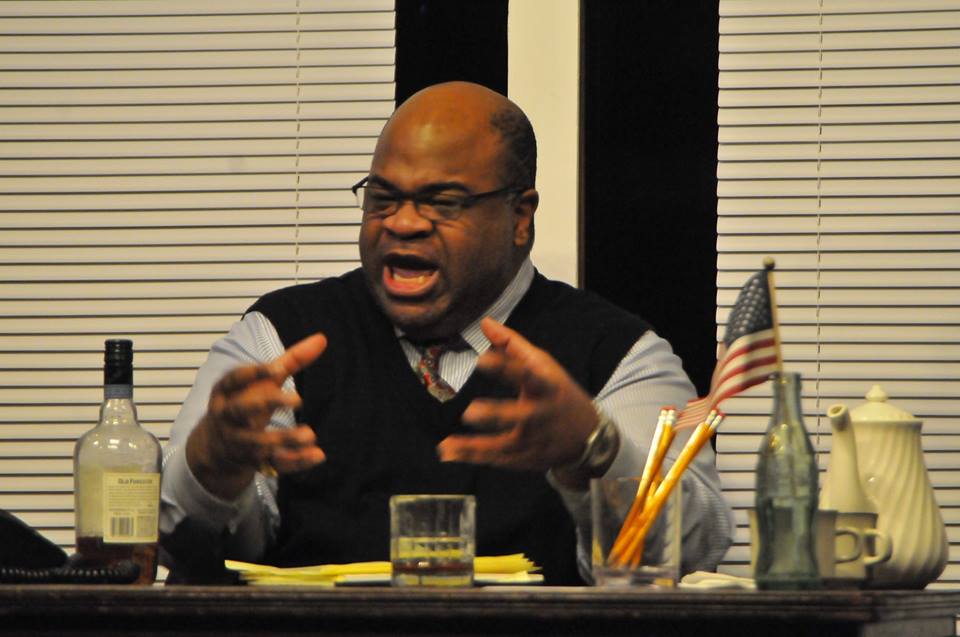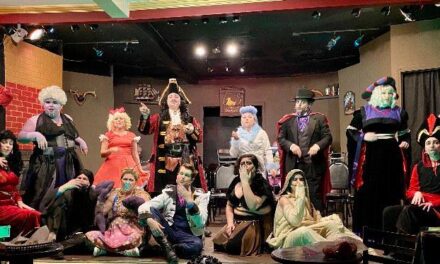Brian West, Jason M.Jones, & Tom Luce. Photo: John Rectenwald
Haunting Julia
By Alan Ayckbourn
Directed by Tony Prince
The Liminal Playhouse
A review by Jason Roseberry
Entire contents are copyright © 2019 by Jason Roseberry. All rights reserved.
In The Secret Garden, Pulitzer-prize winning playwright Marsha Norman writes, “They’re only a ghost if someone alive is still holding on to them.” It is very clear from the top of Haunting Julia that the three characters we meet are haunted by Julia long before she gets the chance to do any haunting of her own. Set in November of 1993 at the newly established Julia Lukin Music Centre, Haunting Julia tells the story of Julia Lukin, a piano prodigy who apparently committed suicide at the age of 19. Twelve years later, her father (Joe), her would-be boyfriend (Andy), and a psychic (Ken) gather to revisit that fateful night, and, from there, the plot begins twisting.
Haunting Julia is the first play in Ayckbourn’s Things That Go Bump trilogy. The play premiered at the Stephen Joseph Theatre in North Yorkshire on April 20, 1994. Up to this point in his career, Ayckbourn was best known for his satirical comedies about the English lower-middle-class, and Julia received mixed reviews – mostly due to critical response towards this stylistic departure.
All technical elements in this production were quite strong. Joey Arena’s scenic design was very effective. Jesse AlFord’s lighting and Richard McGrew’s sound design helped establish the tone as serious and not campy, which is a genuine risk with this script. Director Tony Prince also did a great job navigating the tone of the production. Anytime a script delves in the supernatural there is a chance it could lean towards melodrama or “silliness,” but Prince (and his actors) did a great job maneuvering this challenge.
In his director note, Prince postulates on the genre, “Is it a psychological suspense drama? A traditional British mystery? An eerie ghost story?” Prince surmises (and I agree) that it is all of the above. In fact, while the plot turns are revealed, Prince twists through these genres as well with his direction. Prince intentionally shifts his actors from mystery to psychological drama, and it makes the story that much more interesting for us as an audience. In fact, my only improvement would have been in the pacing. There are times when I would like to have seen the dialogue (and monologues) driving a bit more. In these moments, Prince chose to emphasize the drama over the mystery, and, for me, it caused some “drag.”
Tom Luce (Joe) plays a masterful grieving father. While Andy (Jason M. Jones) would much rather move on, Joe is the person “holding on” to Julia, and Luce’s emotional performance is connected, motivated, and compelling. Jones stretches from his comedic roots to capture the doubting Andy. His journey is very much the same one the audience has to take, and Jones does a great job keeping the production grounded. While there is nothing flashy in this character, Jones provides the backbone that allows Luce and Brian West (Ken) to shine, and his catharsis towards the end of the show hits all the right notes. Brian West has, perhaps, the most difficult role of all. Psychics have been played for comic or camp effect in countless plays and movies. While I can’t share much here without spoiling some surprises, I can say that West touches on this stereotype (in a good way), but also finds honest and authentic moments. This is a difficult role to land, and I felt like the casting (kudos to Prince) and West’s performance was quite effective.
However, by the end of the play, our favorite character is none other than Little Miss Mozart (Julia) herself. The less said here the better, but the character of Julia slowly materializes before our eyes throughout the evening thanks to the work by Melinda Beck, effective and chilling effects by the technical team (Joey Arena, Jesse AlFord, and Richard McGrew), and the three onstage actors who do such an excellent job of bringing her (back) to life so to speak.
Liminal Playhouse’s mission is to, “embrace, explore, and celebrate the ambiguous, and sometimes paradoxical nature of our shared humanity.” Haunting Julia isn’t the type of play you would typically see produced by a local theatre, but it makes complete sense as part of Liminal Playhouse’s mission. This company plays an important role in our local theatrical community by providing opportunities for actors, directors, and audience members to tackle scripts they wouldn’t normally get the chance to do. When it comes down to it, Haunting Julia is a really good ghost story with lots of heart. Although it is less “scary” and more “spooky,” Haunting Julia is a good production, and exactly the type of show you want to see right now in this Halloween season.
Haunting Julia
October 24, 25, 26, 31, & November 1 & 2 @ 7:30 PM
October 27 & November 3 @ 2:00 PM
Tickets are $22 day of the show or $20 in advance at https://TheLiminalPlayhouse.org.
The Liminal Playhouse
The Henry Clay Theatre
604 S. 3rd Street,
Louisville, KY 40202
Dr. Jason Roseberry is the Artistic Director of TheatreWorks of Southern Indiana, an alumnus of the Actors Theatre of Louisville Acting Apprentice program, and a past director at Silver Creek High School. Jason is also a playwright and lyricist. Some of his produced plays and musicals include: “Burke and Hare”, and “E.A. Poe, Into the Mind of Madness” both at (Edinburgh, Scotland Fringe Festival),”The Red Room” Off-Broadway, Louisville Repertory Company, (Humana Festival/Heideman Award Finalist), “The Invisible Man” (Actor’s Theatre of Louisville), “Finders Keepers” (OOB-Expanded Arts, Kitchen Sink Festival Winner), “Freshman Year” (Ball State University), and “Romeo & Rosaline” (SCHS, Indiana Thespian Festival). Jason is currently the Chief Innovation Officer for Five-Star Technology Solutions, an educational technology company.





